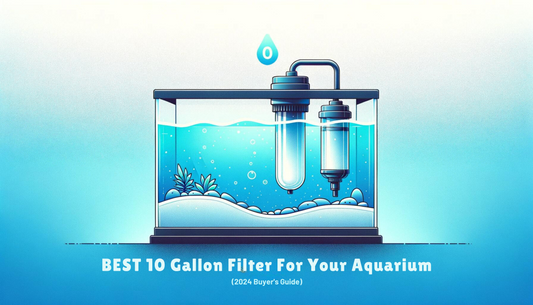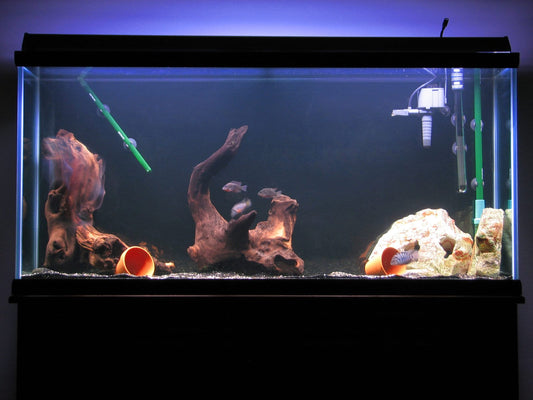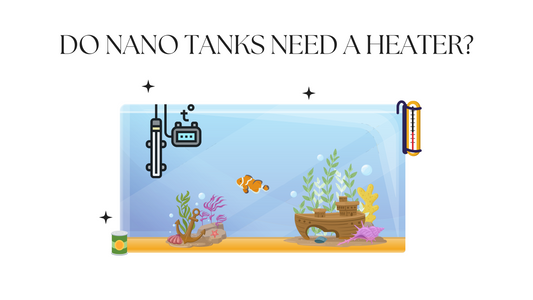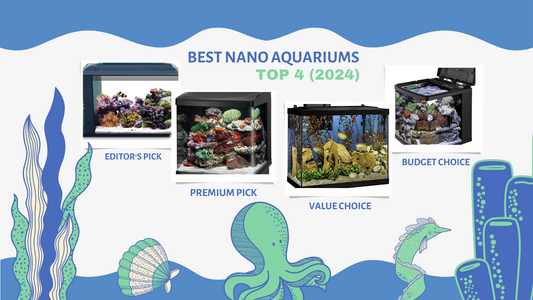How Long Do Clownfish Live? (Clownfish Lifespan)

You know "Finding Nemo," right? I mean, who doesn't? That movie didn't just win our hearts; it practically sent the Ocellaris clownfish fan club membership through the roof!
Bold and beautiful, clownfish are some of the most popular marine fish in the aquarium hobby. Their wobbling swimming habits and vibrant colors are a treat to watch.
But many folks might be wondering just how long clownfish live before they go out and buy some of these delicate creatures for the first time.
Will you be able to enjoy these beautiful fish for several years? Or do they just live for a year or two before passing on? In this post, I will be discussing the lifespan and life expectancy of a clownfish and other important care tips!

What is the average lifespan of clownfish?
The lifespan for clownfish species in a home aquarium is typically around 3 to 6 years.
Oh, but did you know? Clownfish can actually live a super long time, like up to 15 years or more, if they're living in ideal conditions. Just imagine, the same fish sticking around from kindergarten to your high school graduation!
You'll be amazed by this: bigger clownfish like the Maroon Clownfish can live for 5 to 7 years, which is pretty cool, right?
But here’s the real mind-blower – the Percula Clownfish can live for up to 30 years in its natural habitat. That's right, 30 years! This longevity stands out compared to the lifespans of other fish.
Generally, clownfish in the wild have a longer potential lifespan compared to those kept in captivity, but here are some important tips to increase the average lifespan of your tank-raised clownfish.
Tank Setup for a Longer Life Expectancy
You must ensure that you have an ideal tank setup for your clownfish.
Fully mature fish of this species typically reach a size of 3 to 4 inches, and they may encounter both stress and ammonia poisoning when confined in an inappropriate tank size.
Limited space can also hinder their ability to move freely, resulting in poor living conditions and increased stress levels.
An ideal way to maximize your clownfish's average lifespan is by providing it with spacious settings, choosing the right tank mates, and catering it to pristine water conditions.
What Tank Size Do Clownfish Need?

If you're wondering how long clownfish live, you may be surprised that the size of the tank is a huge factor. Clownfish require space for both shelter and exploration.
The ideal size of the tank for clownfish species depends on the type of clownfish you are interested in.
Different clownfish species will require different tank setups. Smaller species like Percula, Skunks, and Pink Skunk can be kept in aquariums as small as 20 gallons to 30 gallons.
The Larger Maroon, Clarkii, and Cinnamon Clownfish should be kept in 40 to 55-gallon aquariums or larger.
Now, while it might appear as an overly large tank for its size, this dimension will provide ample space for a fully grown clownfish. It also eliminates the need for future tank upgrades and reduces the need to perform frequent water cleaning.
Suitable Tank Mates for Clownfish

Are you planning to add other breeds to your clownfish aquarium? If yes, you will have to do some research to find a compatible fish to coexist with your clownfish without significantly affecting its potential lifespan.
An important thing to consider is the temperament of your clownfish. Clownfish are characterized by their slow and non-aggressive nature, so it is of great significance to never put large fish with aggressive nature and territorial behavior in a clownfish aquarium.
Groupers, lionfish, and triggers can pose a threat to clownfish and may see them as potential prey.
Below is a list of compatible fish that will make excellent tank companions for your clown fish:
- Royal Gamma
- Cardinalfish
- Tangs
- Damselfish
- Wrasses
- Angelfish
- Dart Fishes
- Marine Invertebrates
- Chromis
These fish will be great tank mates for saltwater fish like your clown fish because they are generally peaceful, which makes them good candidates for cohabitation.
Compatibility greatly contributes to the overall health of your aquarium. Mixing incompatible species can lead to stress, which may weaken the immune systems of fish and make them more susceptible to diseases so make sure to only choose the right fellow fish for your clown fish!
Ensure Optimal Water Conditions

Clownfish are classified as tropical and saltwater fish, rather than freshwater fish. Thus, setting up saltwater aquariums for proper clownfish care has the potential to increase their lifespan and life expectancy.
It is important to maintain specific water parameters, including salinity, tank temperature, and pH, to mimic the natural habitat of clownfish.
- SPECIFIC GRAVITY. Maintaining an ideal water quality includes achieving a specific gravity or salinity level in the range of 1.020 to 1.0205 for most clownfish species.
- TANK'S TEMPERATURE. A temperature from 73 to 80℉ is ideal for clownfish; much colder or hotter is actively stressful for them.
- ACIDITY AND WATER HARDNESS. Clownfish thrive in typical reef conditions, which means the chemistry should fall between a pH of 8.1 to 8.5.
In addition to the list above, ideal water hardness can be replicated by introducing crushed shells and pieces of coral into the tank as it maintains magnesium and calcium levels found in seawater.
Keeping in mind the water parameters mentioned above will greatly increase your clownfish' life expectancy!
Do Clown fish Need Sea Anemone?

Watching clownfish dart in and out of a gently wafting sea anemone is one of the peak pleasures of owning a marine aquarium. Most of us are already familiar with the mutualistic relationship that clownfish have with their anemone homes.
The clownfish gains a home covered in stinging tentacles. As rather poor swimmers, these little fish spend most of their time watching the world float by from safety.
Clownfish also drop bits of food and even poop onto the sea anemone's mouth. This added food helps the anemone grow larger and faster.
But do clownfish need a sea anemone to survive? Not at all; all species of clownfish can live as free-swimming pets in a fish-only aquarium. Not providing an anemone will not significantly contribute to a longer lifespan.
I don't recommend sea anemones for beginner aquarists, anyway. Anemones require intense lighting to drive their photosynthetic processes.
They are also very sensitive to poor tank conditions. Even the low levels of ammonia and nitrite found in newly set up aquariums can be fatal to them.
Pro Tip: I always recommend using Seachem Prime Fresh and Saltwater Conditioner. It's like giving your clownfish a five-star underwater hotel experience—it detoxifies that nasty stuff and keeps your colorful buddies happy and healthy.
Balanced Diet for Proper Clown fish Care

A varied diet is just as important as water quality when it comes to ensuring your clownfish live for a long time. Clownfish are omnivorous fish, eating a mixture of algae, zooplankton, and leftovers from their host anemone.
Take them in a home aquarium and they still should be offered a diverse and healthy diet. Many frozen food blends cater to this need by offering a selection of marine algae, plankton, mysis or brine shrimp, and other food, all at the same time.
A pellet or flake-based formula can also be kept on hand to feed clownfish. Just make sure the ingredients list includes a wide range of whole foods like spirulina, krill, and squid meal. All of which form a natural part of the diet of wild clownfish.
Fillers like potato starch, wheat, corn, and soy are not only bad for your fish, but they can also significantly reduce clownfish lifespan.
Clownfish Common Diseases Reducing their Lifespan

One of the best ways to increase the potential lifespan of your clownfish is to consistently observe its behavior, watching for any indications of illness.
Despite providing thorough care and maintaining a clean environment, it's important to recognize that fish diseases may still occur.
Infections can potentially be transmitted from other fish, live food sources, or even due to the presence of harmful bacteria in the water.
Here are some of the common diseases that you can watch out for to make sure your fish lives a long and healthy life.
White Spot
Similar to freshwater fish, saltwater clownfish are also susceptible to fungal infections. One of the most prevalent issues is marine ich, characterized by white spots, which is caused by parasites known as Cryptocaryon irritans.
The illness typically initiates with the appearance of white spots on the gills, fins, or body. Additional symptoms may include heightened mucus production, pale gills, hazy eyes, and ragged fins.
If you are familiar with freshwater ich, white spots closely resemble its appearance, but it is caused by entirely different parasites.
Hole in the Head Disease
This one is less common but it's still possible for freshwater and clownfish to be acquired.
It is also called as lateral line erosion because it targets the lateral line, which is the part of the fish responsible for sensing vibrations. You may observe the affected area appearing depressed with black, white, or brown colors.
The cause of this particular disease is not known, that's why it is important to consult a vet to properly manage symptoms and treatments for your clownfish.
Swim Bladder Disorder
At times, you may observe your fish having difficulty swimming which appears as if they are losing balance and swaying back and forth. This is a typical indication of a bladder disorder.
Some of the treatments for this disease include raising the temperature of the tank, cleaning its water, and giving the clownfish a salt bath.
Fin Rot
When fish feel excessive stress or are subjected to bullying by their tank mates, they can become vulnerable to fin rot.
You will observe signs such as reddening or fraying of the fins, and in severe instances, complete deterioration of the fins.
Moreover, the affected fish may display altered behavior including isolation, loss of appetite, and heightened inactivity.
Upon observing any of these symptoms, it is crucial to transfer the infected fish to a quarantine tank. Frequent water changes and salt baths can also be beneficial in addressing the issue.
Diseases in a saltwater aquarium are unavoidable, but clown fish live long if you are patient in managing them.
Clownfish: Parental Roles
Most species of clownfish are easygoing, but please be aware that a few of them can be aggressive.
In Disney's Finding Nemo, there is this touching scene that depicts the mother's sacrifice to protect the clownfish eggs (offspring), which explains an instance where a large dominant female may bite your hand when you start cleaning the insides of the glass!
Key Takeaway
In conclusion, the lifespan of clownfish is a fascinating subject that sheds light on the intricate world of marine life. These vibrant and iconic fish have captivated the hearts of aquarium enthusiasts and moviegoers alike. The remarkable journey of clownfish in an aquarium is a testament to the wonder and fragility of marine life, reminding us of our role as stewards of the ocean's treasures.
Through deep knowledge and dedicated care, you will be able to witness your clown fish alive and swimming for a long time!
Have more questions?
Craving more info or itching to flaunt your own splashy slice of the ocean? We'd love to see it! Hop into our water-loving community, hit the 'like' on our page, and share your clownfish stories or coral reef setups. Join the wave of discussions with other clownfish aficionados and let's make a splash together!
>> Join our Facebook Group Here <<

Hungry for more reef-keeping knowledge? We've got a whole library of articles waiting for you!
No comments









comments